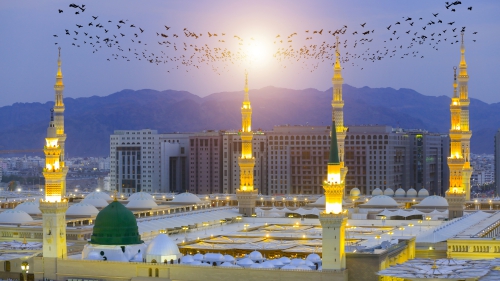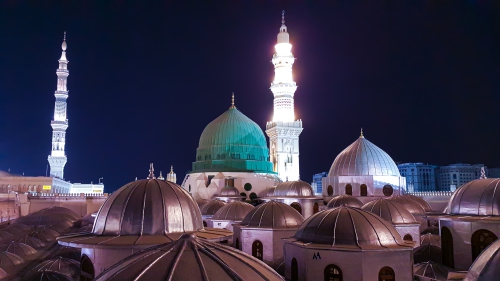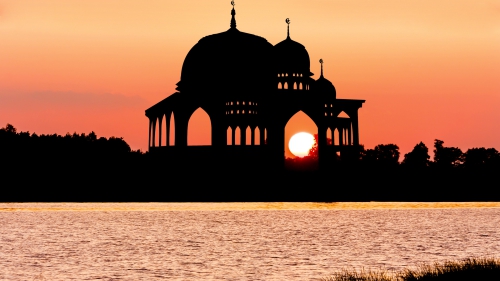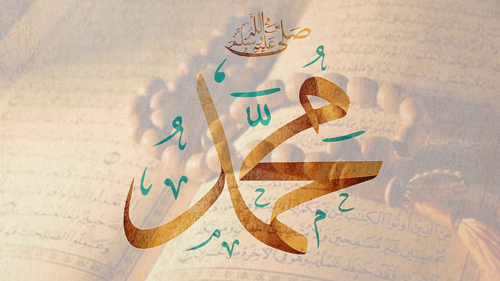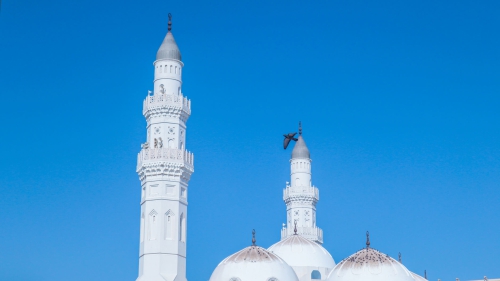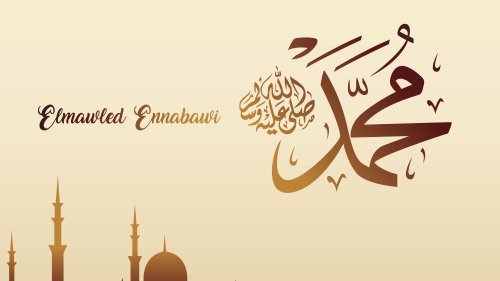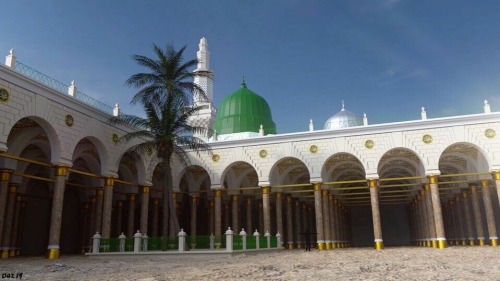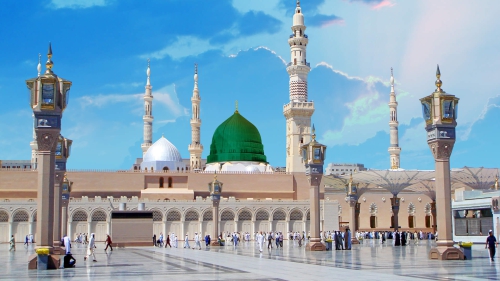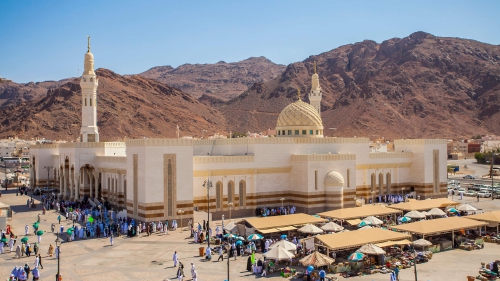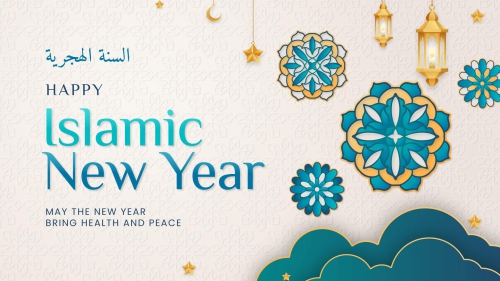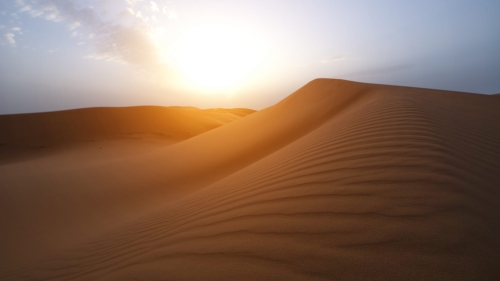Madinah Roads during the Prophet's Time

In the broad urbanization scheme of the Prophet Muhammad (pbuh), roads played a very important role. They linked up different city points, thus facilitating communication, access and unhindered movement of people and goods. The Prophet (pbuh) was very much concerned about the rights of the road and its users, as well as about the roads' width and cleanliness, the smooth flow of the traffic, etc. The lesson bequeathed by the Prophet (pbuh) in this regard is that roads are to be planned, constructed and maintained in such a way that no harm or inconvenience is caused to anyone.
About the width of the road, the Prophet (pbuh) said that if the people disagree about how wide a road should be, then they should make it as wide as seven cubits (about 3.50 meters). The word is that by saying seven cubits the Prophet (pbuh) meant the minimum width of public roads, and the basis for that is to allow two fully loaded camels to pass. However, the bigger and wider a road the better it is. The only thing that matters is that the full consent of every party involved is sought, as well as that no resolution is reached which may contravene any of the objectives of the Islamic law (Shari'ah), namely the preservation of the faith, life, intellect, posterity, and wealth of the Muslims. The Prophet (pbuh) never meant to prescribe the width of roads from which there could be no deviation.
The Prophet (pbuh) said in one hadith: "Those who constrict (people's) houses (by building excessively and gratuitously for themselves) and encroach on the road will not be credited with jihad." The Prophet (pbuh) said this during one of his military expeditions. By the words "... will not be credited with jihad" he meant to make his companions aware of the seriousness of such issues as the importance of houses and roads, privacy, freedom of movement, accessibility, safety, security, and other basic rights that one is expected to generously enjoy in a settlement.
Drawing attention to the distinctive significance of roads, the Prophet (pbuh) directed his companions to avoid needlessly sitting on them, lest the projected roles and functions of roads might be contravened, one way or another. The companions, however, replied that such a thing sometimes is difficult to desist. On this, the Prophet (pbuh) said that they, in that case, must respect the rights of roads, as they belong to the public and everyone is entitled to their free and unobstructed use. Asked about the rights of roads, the Prophet (pbuh) answered: "Avoid staring, do not create harm, salute back those who salute you, and enjoin what is good and forbid what is evil." Roads, thus, are not to contain facilities and services that promote and encourage loitering which, in turn, can lead to a number of social issues and problems related either to the loiterers or the road users.
Allah says in the Qur'an: "O Prophet! Tell thy wives and daughters, and the believing women, that they should cast their outer garments over their persons (when out of doors): that is most convenient, that they should be known (as such) and not molested. And Allah is Oft-Forgiving, Most Merciful." (al-Ahzab 59)
During the early days of the Madinah community, some city profligates used to come out, especially at night, to the city's thoroughfares intending to disturb the women who would move around looking after their personal and family affairs. The problem must have been, to some extent, alarming, given that the women, too, actively participated in religious and community activities customarily held in the Prophet's mosque complex. The Prophet (pbuh) also directed men to allow their women to go to the mosque even at night. Thus, the categories of women mentioned in the verse have been decreed to cast their outer garments over themselves when they are outdoors, in order to be recognized as pure, virtuous and respectable, and, as such, to stay protected from harm and molestation.
It was partly because of this, and partly because of the other Islamic tenets and principles that govern the relationship between opposite sexes unrelated to each other, that the Prophet (pbuh) instructed men and women not to mingle freely on the road. They were to keep to different sides. One day the Prophet (pbuh) came out of the mosque and on seeing the men and the women mingling in the road he exclaimed: "Draw back, for you must not walk in the middle of the road; keep to the sides of the road." Then, the women were keeping so close to the walls on the sides of the roads that their garments were rubbing against them. Having finished the prayer in the mosque, the Prophet (pbuh) used to stay at his praying place for a while until the women who also prayed in the mosque departed and entered their houses. This was in all probability the routine of all the men inside the mosque, since the Prophet's companions did their utmost to emulate their mentor in virtually everything and in the minutest details. Towards the same end, indeed, were the Qur'anic as well as the Prophet's persistent injunctions that both believing men and women, when outdoors, lower their gazes, dress modestly and properly, apply shyness and self-respect to their overall demeanor and interactions, etc.
There were several main roads that led from the Prophet's mosque to different points of Madinah crisscrossing the city's landscape. On the strength of some reliable historical accounts, it is obvious that one of such thoroughfares led up to the Sal' hill in the northwest, another one led through as far as to the suburb of Quba' in the south, whence a third road stretched up to the burial ground of al-Baqi' in the southeast in the vicinity of the Prophet's mosque. Many smaller streets and roads regularly branched off these highways on both their right and left sides, thus forming a network of streets and roads which led to and intersected the city's residential areas, gardens, estates and the market.
In view of the remarkable importance of the roads and how vital the concepts of cleanliness, orderliness, public convenience, safety, security, excellence and management are in the Islamic world-view, it is not surprising that maintaining roads and keeping them in good condition is extremely commendable in Islam. The Prophet (pbuh) said on many an occasion that cleanliness -- be it the cleanliness of the body, dwelling places, courtyards, streets, markets, rivers and the whole natural or man-generated surroundings -- is a branch of the faith (iman). He also said: "God is good and loves goodness; He is clean and loves cleanliness; He is kind and loves kindness; He is generous and loves generosity." In order to cause no damage to the environment, or inconvenience to themselves and humans in general, Muslims are furthermore cautioned against defecating or urinating in water springs, on paths and in shaded places. The Prophet (pbuh) called such acts as serious abominations.
The Prophet (pbuh) also said that a branch of faith is the removal of that which is injurious from the road. Such an act under certain circumstances can even be a cause for one's sins to be forgiven and to be admitted into Jannah (Paradise). The Prophet (pbuh) disclosed: "While a person was going along the path, he found a thorny branch upon it. He pushed it to a side and Allah approved this action of his and granted him forgiveness."
The companion Abu Hurayrah reported the Prophet (pbuh) as saying that he had seen a person enjoying himself in Jannah because of the tree that he had cut from the path, which was a source of inconvenience to the people.
A man called Abu Barza reported that he asked the Prophet (pbuh) to teach him something so that he could derive benefit from it. The Prophet (pbuh) told him to remove the troublesome things from the paths of the Muslims.
Recognizing the worth of the subject at hand and how much attention the Prophet (pbuh) had paid to it, Muslim b. al-Hajjaj in his compilation of hadith (Sahih Muslim) entitled one of the subtitles in the "Book of Virtue, Good Manners and Joining the Ties of Relationship" (Kitab al-Birr wa al-Silah wa al-Adab) as "The Merit of Removing Anything Troublesome from the Path".
Aiming to establish and sustain healthy and ethical interactions between road users, the Prophet (pbuh) introduced several measures. Apart from what has been said thus far, it is worth mentioning that the institution of mutual greeting (salam) occupied a very prominent place, too. The people were advised to greet everyone: the young should greet the old, the passerby should greet the sitting one, the riding one should greet the walking one, and the small group of persons should greet the large group of persons. The Prophet (pbuh) used to salute even the children.
Many forms of charity - a deed required of every Muslim on a daily basis - could be easily accomplished on the road if people were mindful of the actual status and purpose of the road. To this end, the Prophet (pbuh) said: "Charity is obligatory everyday on every joint of a human being. If one helps a person in matters concerning his riding animal by helping him to ride it or by lifting his luggage on to it, all this will be regarded charity. A good word, and every step one takes to offer the compulsory congregational prayer, is regarded as charity; and guiding somebody on the road is regarded as charity."
*****
Dr. Spahic Omer, a Bosnian currently residing in Malaysia, is an Associate Professor at the Kulliyyah of Architecture and Environmental Design, International Islamic University Malaysia. He studied in Bosnia, Egypt and Malaysia. His research interests cover Islamic history, culture and civilization, as well as the history and philosophy of the Islamic built environment. He can be reached at spahicoyahoo.com; his blog is at www.medinanet.org.
Topics: Madinah (Medina), Women
Views: 7709
Related Suggestions






